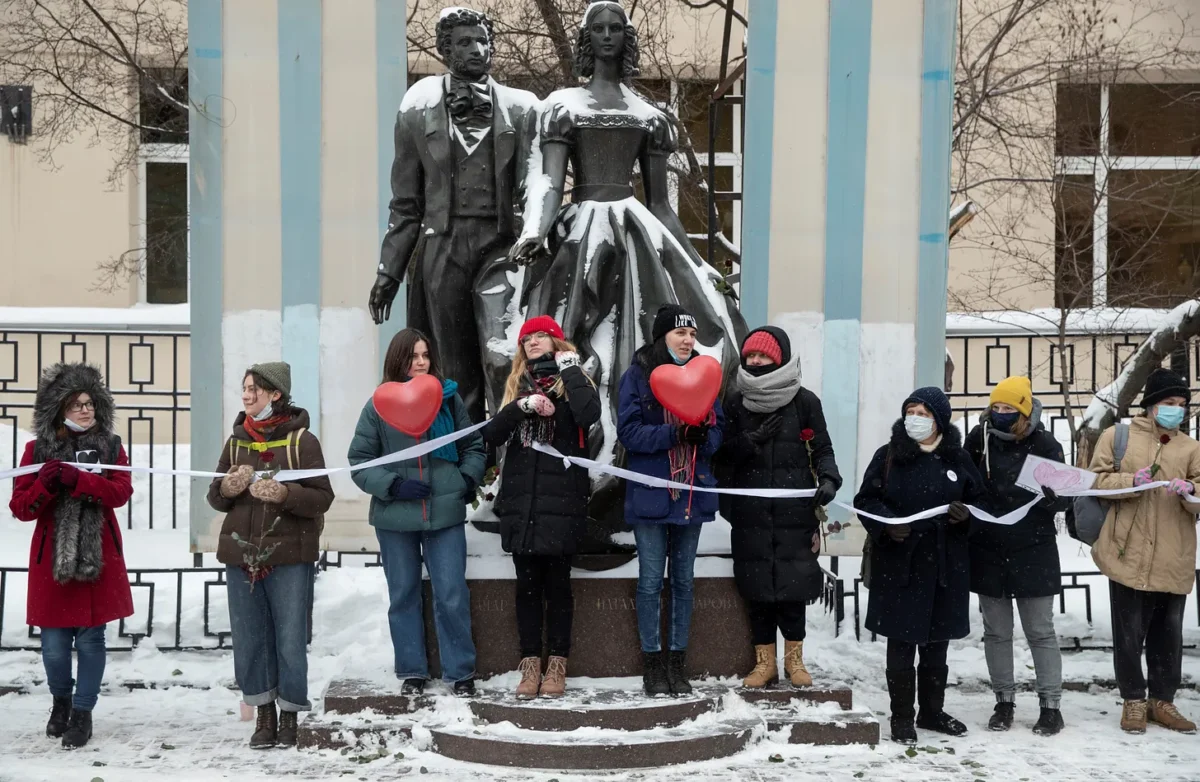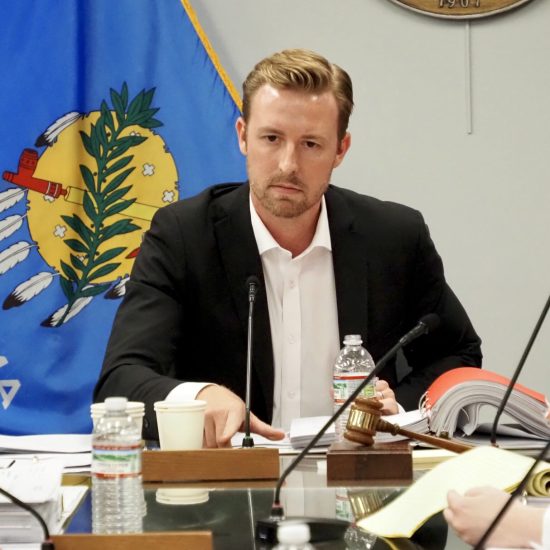
The annual holiday of love is under attack this year. And it’s not from churches encouraging people to fast. Nor is it from clergy who plan to “celebrate” on Wednesday by wiping ash on people while telling them to remember their own mortality — though talk about a mood-killer! The threat isn’t from the mashup of Valentine’s Day and Ash Wednesday. The call for war is coming from the Russian Orthodox Church.
Patriarch Kirill, who has been a top cheerleader for the Russian invasion of Ukraine, spoke recently about the importance of defending “traditional family values.” Framing Russia as a “Christian” culture specially blessed by God, Kirill aimed his ire at abortion, LGBTQ+ activism, and that holiday with heart-shaped candy.
“Thank God, LGBT propaganda in our country was prohibited at the legislative level. However, it is important to go further. The celebration of the so-called ‘Valentine’s Day,’ imported from the West, also raises many questions,” Kirill argued. “Despite all attempts to ennoble it, [Valentine’s Day] still remains propaganda of relationships that have nothing to do with true love.”
“The popularity of this holiday is associated with the spread of the ideas of free love,” he added before talking about educational reforms he wants so children are taught about the importance of large families and aren’t exposed to “questionable” books featuring families that don’t match his ideal.
Kirill also took a shot at Halloween, condemning it as “ugly bacchanalia brought to us from abroad” that “causes great harm” when observed in schools. Of course, that also fits since the Orthodox Church doesn’t celebrate All Saints’ Day (also known as All Hallows’ Day) on Nov. 1 but just after Pentecost in May or June. Together with his anti-Valentine’s Day position, Kirill seems determined to ruin childhood.

Screengrab as Patriarch Kirill of the Russian Orthodox Church speaks in Moscow on Jan. 24, 2024.
Kirill often sounds basically like Tucker Carlson with a cassock (and better Russian fluency). In his recent speech, he defended Russia’s imperial war against Ukraine and the Putin regime’s persecution of Christians and others in Russia, while also issuing his broadside against a day most associated with cute notes in elementary school, red roses, and (I hope) chocolate-covered strawberries. His condemnation of the candy holidays might seem a bit frivolous compared to his other areas of focus. Yet, it represents his Christian Nationalistic desire to control every aspect of society.
His attack on Valentine’s Day also creates a particularly ironic target. After all, one of the main stories about the man who gave name to the holiday is about his holy work to nonviolently undermine an imperial war. All in the name of love.
With a bloody cleric adding Valentine’s Day to his culture (and literal) wars, perhaps it’s worth looking deeper into the mythology behind Valentine’s Day. So I’m dropping this treat known as A Public Witness into your Valentine’s inbox to peel away the shiny wrapper of a Hallmark holiday and find a heartfelt story worth sharing with classmates and friends.
Don’t Know Much About History
Despite the fact that Valentine’s Day is a massive holiday, we actually don’t know that much about the man Valentine (or Valentinus). Some of the stories frequently told have been debunked, and people who’ve studied the history disagree on other details.
Additionally, the stories about Valentine, even if they are true, might be about two or three different people. Apparently, it was a popular name back in ancient Rome. In fact, the Catholic Church honors as saints about a dozen different Valentines (or is it Valentini?), including a Pope Valentine (which sounds way cooler than any Valentines I’ll get this year).
The Valentine (or Valentines) associated with Feb. 14 was an early Christian priest or bishop in central Italy in the third century. At the time, Christians were persecuted. Yet, he wasn’t merely open about his faith; he also ministered to his fellow Christians and evangelized others. For that, he was executed on Feb. 14, 269 — and perhaps there were a couple of Christians named Valentine killed on that day, which led to them being conflated.
Even with the historical uncertainties, there are still some interesting morals embedded in the tales long told about our St. Valentine we celebrate this week. The most common story is that as Valentine spoke about Jesus and salvation to an aristocrat, the man pointed to his blind daughter and challenged Valentine to heal her. After a prayer, she could see and the whole family converted. That led to Emperor Claudius Gothicus ordering Valentine’s beheading. Some versions add that Valentine witnessed to Claudius in an attempt to convert the emperor, with that audacious act being what sealed the priest’s fate.
Another story that emerged later was that Valentine also performed illegal marriages for men conscripted to fight in the military. These marriages, the story often goes, either allowed men to avoid military service or were secret unions to help them get around a rule based on the belief that unmarried men made better soldiers.
Whether the stories are true or not isn’t the point. St. Valentine’s fame — and eventually the attention to the religious feast day in his honor — rose because of such tales over the centuries after his martyrdom. Churches across Europe came to claim they have part of Valentine’s body as sacred relics that people can see while they pray, which doesn’t sound like a good activity for a romantic date. Without the stories — real or exaggerated — we probably wouldn’t know the name of our famous February saint. The stories aren’t really about teaching history but giving us a moral exemplar to follow.
“Historical veracity did not count for much with medieval Christians. What they cared about were stories of miracles and martyrdoms, and the physical remains or relics of the saint,” explained historian Lisa Bitel. “Much like love itself, St. Valentine and his reputation as the patron saint of love are not matters of verifiable history but of faith.”

Left: Shrine of St. Valentine in Whitefriar Street Carmelite Church in Dublin, Ireland, that claims to include part of Valentine’s remains. Right: Painting of St. Valentine in the Chapel of Our Lady of Altbronn in Ergersheim, France.
One other interesting detail worth noting is that the recognition of Valentine’s life and death didn’t initially equal a day of romance. Which makes sense because it does seem odd to mark a guy’s beheading by giving someone a necklace. “Hey, girl, I’m falling head over heels in love with you.”
It didn’t become a romantic holiday until English poet Geoffrey Chaucer wrote “Parliament of Fowls” late in the 14th century and declared, “For this was on Saint Valentine’s Day, when every bird comes there to choose his mate.” But it’s possible he meant a different Saint Valentine honored on May 3, but whose feast was less known than the Feb. 14 one so people just started thinking romantically about the wrong one. Thus, it might be that Americans will spend more than $25 billion on cards, gifts, and candy this week thanks to a misreading of a 600-year-old poem!
It might be tempting with such historical issues to join Patriarch Kirill in condemning Valentine’s Day. But let’s not throw the baby out with the bath bomb. If Kirill wants to ditch a holiday simply because it’s been over-commercialized, he’ll need to skip Easter thanks to the jellybeans, Peeps, and chocolate crosses (which I should stock up on this year so I can take it up daily). And if he’s worried about a celebration being co-opted by those he disagrees with, then he’ll probably need to cancel just about everything.
What if the real problem for him isn’t modern traditions but the lessons the stories about St. Valentine teach us?
Get cutting-edge analysis and commentary like this in your inbox every week by subscribing today!
A Subversive Valentine?
In the same speech where Kirill attacked Valentine’s Day, he also again justified the Russian war against Ukraine and the persecution of Russians who voice dissent about the war. Using phrases like “the countries of the historical Rus’” to describe a Russian ethno-vision that extends far beyond its current national boundaries, he put a spiritual gloss on the effort to violently claim Ukrainian land. Given his record of baptizing the war as a holy crusade and claiming that dying for Russia is a salvific act, his implicit references to Rus’ peoples made clear how he views protecting “traditional family values” (like opposing Valentine’s Day) as part of a spiritual quest to win the war.
He also criticized dissent as something that arose from the “influence of European liberal ideas” and the books of Enlightenment writers. Casting such ideas as counter to “the original spiritual path of Russia,” he quoted Scripture to argue that those who hold to Western ideas today were the root of dissent against the Russian fatherland. He called such dissenters “sons of disobedience” (a reference in Ephesians 2:2 to those under the devil’s influence) and like the Pharisee in Jesus’s parable (in Luke 18) who saw himself as better than others.
Like with Valentine’s Day, he cast dissent as an import from the West that must be stopped. It shouldn’t be surprising, then, that Russia has been imprisoning those who oppose the war — even criminalizing the use of words like “war” and “peace.” Nor is this a new problem as Russia under the rule of Putin and Kirill has for years persecuted people for sharing their faith, with non-Orthodox Christians frequently targeted along with Jehovah’s Witnesses and Muslims.
Similarly, Valentine’s day in 2021 saw people peacefully dissent against Putin’s regime. Political opposition leader Alexei Navalny had been hospitalized in August 2020 after being poisoned. Upon his return to Russia in January 2021 after medical treatment in Germany, Navalny was promptly arrested — and he remains in jail today simply for challenging Putin’s rule. Less than a month after his arrest three years ago, supporters chose Valentine’s Day to show solidarity. Some formed human chains as they held hearts and messages of support, and others that evening arraigned candles in the shape of a heart.
“Putin is fear. Navalny is love. That’s why we will win,” one of Navalny’s allies explained.

Women hold hearts and a white ribbon during a rally in support of jailed opposition leader Alexei Navalny and his wife Yulia Navalnaya in Moscow, Russia, on Feb. 14, 2021. (Pavel Golovkin/Associated Press)
In his recent speech attacking Valentine’s Day, Kirill didn’t mention the earlier protests on that holiday. But he invoked a common saying in religious life to explain how to cooperate with Christians who believe differently on some issues. The saying insists it’s okay to work together as long as there is unity on what really matters. But he defined that in Christian Nationalistic terms at this religious gathering.
“In the main thing, unity; in the secondary, freedom; in everything, love,” Kirill said. “The main thing is loyalty to one’s native country, the desire to work for the benefit of the Fatherland with sincere love and respect for the history and spiritual tradition of the people — with undoubted recognition of the key importance of the Orthodox faith for Russian culture and Russian statehood.”
Such a Christian Nationalistic theology is heretical. It’s also dangerous to define the main thing not as a belief in the lordship of Jesus but as loyalty to a nation. Thus, Russian Orthodox priests who disagree with the war are defrocked. A Baptist pastor who prayed for peace is driven into exile. Christians who invoke their faith as they refuse to fight in Ukraine are jailed. And Baptists and Pentecostals who share their faith with others are arrested and fined.
The Putin-Kirill regime has mixed church and state (and vodka) into an oppressive cocktail. In such a context, someone like the Valentine from the old stories poses a threat. Whether it would be evangelizing despite laws barring it or helping undermine the war effort by saving young men from the frontline, the mythic Valentine would today in Russia face persecution much like he did in the Roman Empire.
Perhaps you’ll enjoy time with a special someone on Wednesday — though it shouldn’t take an overly commercialized holiday to express your love. And maybe you’ll start a Lenten fast and attend a special Ash Wednesday service to ponder eternal priorities in light of the reminder that you are dust. Regardless, I hope we all take time to celebrate the moral courage in the stories of Valentine. May we proclaim the good news even when the powerful don’t like it. And when empires demand more sacrifices on the altar of war, may we declare, “Stop in the name of love.”
As a public witness,
Brian Kaylor

(Brian Kaylor/Word&Way)






